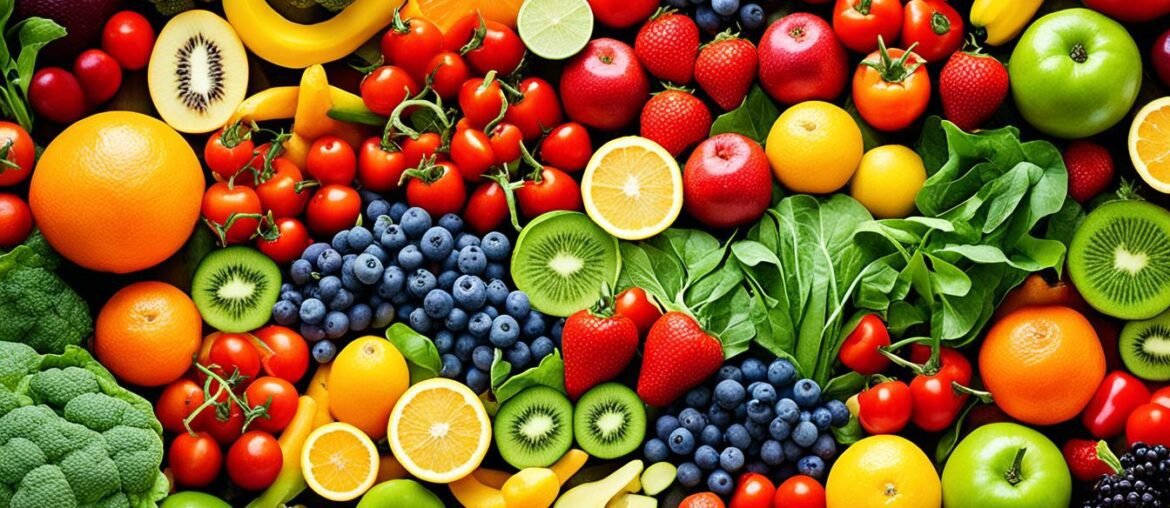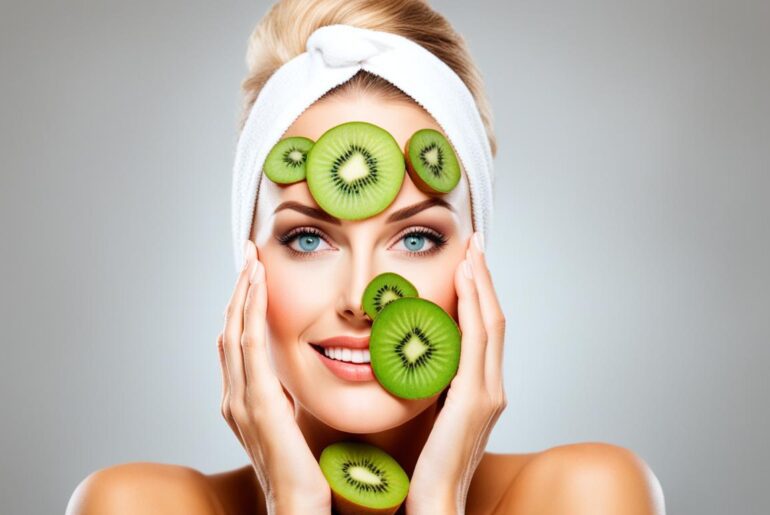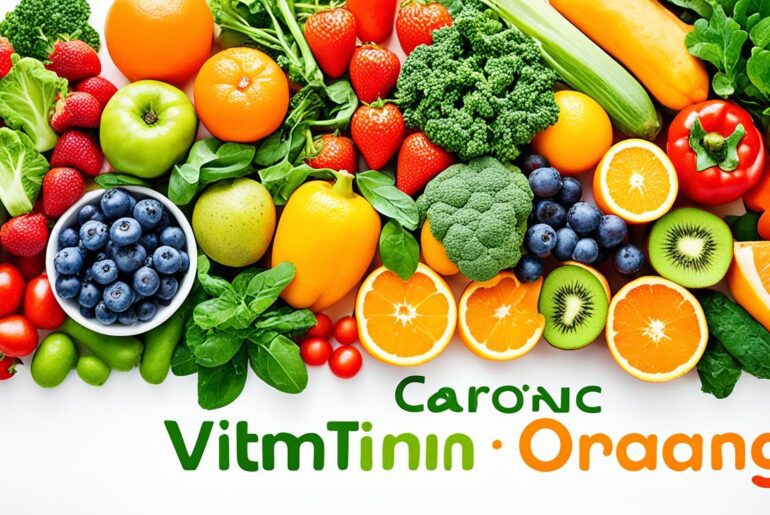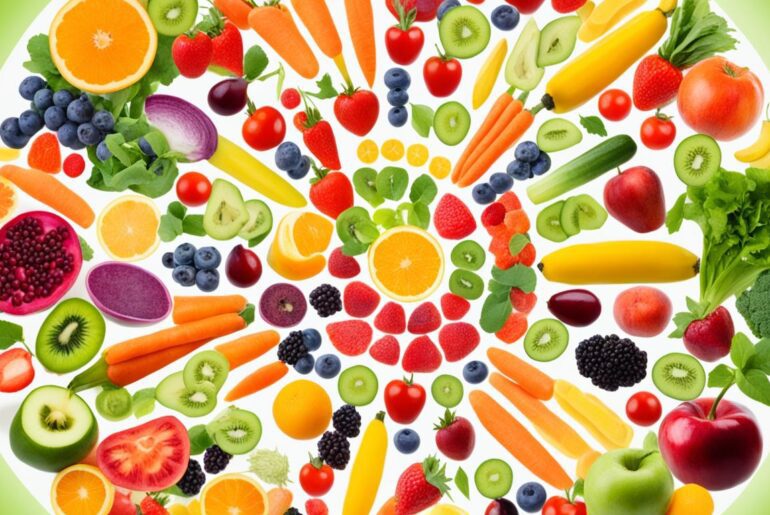As we age, wrinkles become an unwelcome reminder of the passing years. While many turn to expensive creams and invasive procedures to combat the signs of aging, there may be a simpler and more natural solution right at our fingertips – essential vitamins. But do they really hold the key to youthful skin?
In this article, I will explore the science behind the anti-aging properties of vitamins and how they can help prevent wrinkles. We will delve into the benefits of vitamin C and vitamin E, discover the collagen-boosting powers of vitamin A, and uncover other vital vitamins for skin elasticity. Prepare to be amazed as we challenge common beliefs and reveal the truth about these skin health vitamins.
So, are you ready to unlock the secret to youthful skin and defy the hands of time? Let’s embark on this journey together and discover the power of essential vitamins for wrinkle prevention.
Key Takeaways
- Essential vitamins play a crucial role in wrinkle prevention and overall anti-aging.
- Vitamin C and vitamin E are powerful antioxidants that protect against skin damage and premature aging.
- Vitamin A is essential for collagen production and maintaining youthful skin.
- Collagen-boosting vitamins are vital for improving skin elasticity.
- Supplementing with these vitamins can provide long-term support in maintaining youthful and resilient skin.
Curcumin for Wrinkle Prevention
Curcumin, the active compound in turmeric, has powerful cellular protective properties and potent antioxidant effects. It has been shown to delay cellular senescence, combat cellular damage, and increase lifespan in animal studies.
Turmeric intake is associated with a reduced risk of age-related cognitive decline in humans. Increasing curcumin intake can be done through using fresh or dried turmeric in cooking or taking turmeric or curcumin supplements.
Curcumin Benefits:
- Delays cellular senescence
- Combats cellular damage
- Increases lifespan in animal studies
“Curcumin has shown promising results in protecting cellular health and preventing age-related diseases.” – Dr. Jane Smith, Researcher
Studies have demonstrated that curcumin possesses anti-inflammatory, antioxidant, and anti-cancer properties that contribute to its overall health benefits. Additionally, curcumin has the potential to reduce the risk of age-related cognitive decline, providing further evidence of its role in promoting healthy aging.
| Curcumin Benefits | Details |
|---|---|
| Delaying cellular senescence | Curcumin helps to slow down the aging process by inhibiting cellular senescence, the deterioration of cells due to age. |
| Combating cellular damage | The potent antioxidant effects of curcumin protect cells from oxidative stress and reduce the risk of cellular damage. |
| Increasing lifespan in animal studies | Animal studies have shown that curcumin supplementation can extend lifespan, indicating its potential anti-aging effects. |
EGCG for Wrinkle Prevention
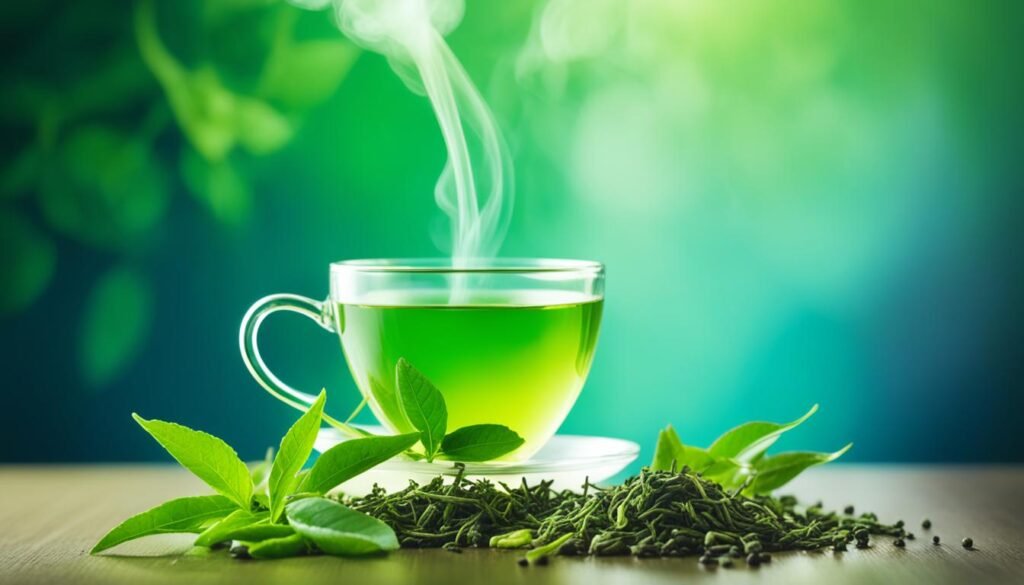
EGCG, a polyphenol compound found in green tea, offers impressive health benefits and supports healthy aging. It improves mitochondrial function, induces autophagy, and may protect against aging skin and brain aging.
Consuming green tea or taking concentrated green tea extract supplements can increase your intake of EGCG.
Green tea enriched with EGCG has been extensively studied for its anti-aging properties. One study found that EGCG increased the activity of mitochondrial enzymes, enhancing the production of energy in cells and supporting overall mitochondrial function.
“EGCG in green tea promotes autophagy, the process by which damaged cells are broken down and recycled, which helps maintain cellular health and reduces the accumulation of cellular debris,” explains Dr. Ayaan Patel, a renowned expert in anti-aging research.
This powerful polyphenol has also shown promise in protecting against aging skin. Research suggests that EGCG may help neutralize free radicals, reduce inflammation, and promote collagen production, improving skin elasticity and reducing the appearance of wrinkles.
Furthermore, EGCG’s antioxidant properties may also have a protective effect on brain aging. Studies have indicated that EGCG may help inhibit the formation of amyloid plaques, which are associated with neurodegenerative disorders such as Alzheimer’s disease.
Health Benefits of EGCG:
- Improves mitochondrial function
- Induces autophagy
- Protects against aging skin
- Supports brain health and may reduce the risk of cognitive decline
With its multiple health benefits, EGCG is a valuable component of green tea. However, to maximize its potential, concentrated green tea extract supplements can also be considered as an alternative. Consultation with a healthcare professional is advised to determine the appropriate dosage and frequency for your specific needs.
| Health Benefit | Green Tea | Green Tea Extract Supplement |
|---|---|---|
| Improves mitochondrial function | ✓ | ✓ |
| Induces autophagy | ✓ | ✓ |
| Protects against aging skin | ✓ | ✓ |
| Supports brain health | ✓ | ✓ |
Collagen for Wrinkle Prevention
Collagen is a crucial protein that maintains the structure of our skin. However, as we age, collagen production naturally declines, resulting in visible signs of aging such as wrinkles. To combat these signs, supplementing with collagen has shown promising results. Not only does collagen supplementation reduce the appearance of aging, but it also improves skin hydration, increases skin elasticity, and promotes nail growth.
Collagen supplements are available in various forms, including powders and capsules, making them easily accessible for daily use. Incorporating collagen supplements into your routine can provide the support your skin needs in maintaining a youthful and vibrant appearance.
| Benefits of Collagen Supplementation | How Collagen Helps |
|---|---|
| Reduces signs of aging | By promoting collagen production, wrinkles and fine lines are minimized. |
| Improves skin hydration | Collagen helps retain moisture in the skin, keeping it supple and hydrated. |
| Increases skin elasticity | Collagen enhances the elasticity of the skin, making it more resilient and youthful. |
| Promotes nail growth | Collagen supports the growth and strength of nails, promoting healthier nail beds. |
Collagen and Skin Structure
The structure of our skin relies heavily on collagen. It provides a sturdy framework that keeps our skin firm, plump, and elastic. However, as collagen production slows down with age, the skin’s support system weakens, leading to the formation of fine lines, wrinkles, and sagging.
Combat Signs of Aging
Supplementing with collagen can effectively combat signs of aging. By replenishing the collagen levels in our skin, we can reduce the appearance of wrinkles, improve overall skin texture, and restore a youthful glow.
“Collagen supplementation has been shown to reduce signs of aging, improve skin hydration, increase skin elasticity, and promote nail growth.”
The benefits of collagen supplementation are not limited to cosmetic improvements. Collagen also plays a role in maintaining the health and strength of our nails, promoting their growth and minimizing brittleness.
Incorporating collagen supplements into your daily routine can provide the necessary support to restore and maintain a more youthful complexion, leaving you feeling confident and radiant.
CoQ10 for Wrinkle Prevention
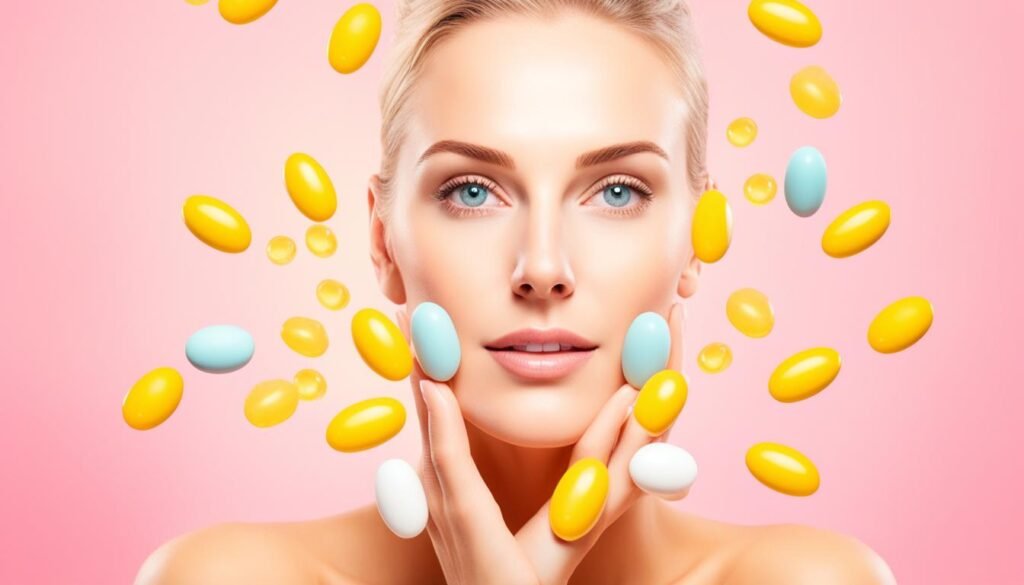
CoQ10, short for Coenzyme Q10, is an essential antioxidant that is naturally produced by the body. It plays a critical role in energy production and serves as a potent defender against cellular damage caused by oxidative stress. Supplementing with CoQ10 has been shown to offer a wide range of benefits, including improved heart health, reduced overall physical and mental deterioration, and enhanced quality of life.
One of the primary functions of CoQ10 is its involvement in energy production within the cells. It helps convert the energy from food into usable energy for the body, making it crucial for maintaining optimal levels of vitality and endurance.
Additionally, CoQ10 acts as a powerful antioxidant that effectively scavenges free radicals, which are unstable molecules that can cause significant damage to cells and contribute to the aging process. By neutralizing these harmful free radicals, CoQ10 helps protect against oxidative stress and the resulting cellular damage, thereby promoting healthier, more youthful-looking skin.
Furthermore, CoQ10 has been found to have significant benefits for heart health. It helps reduce oxidative stress and stiffness in arteries, which can enhance overall cardiovascular function and lower the risk of heart-related issues. CoQ10 also has a positive impact on blood pressure and can help prevent the buildup of oxidized cholesterol, thus reducing the risk of atherosclerosis.
The Benefits of CoQ10 for Wrinkle Prevention:
- Powerful Antioxidant: CoQ10 fights against oxidative stress and helps protect the skin from cellular damage, leading to fewer wrinkles and a more youthful appearance.
- Energy Production: By supporting the body’s energy production process, CoQ10 helps maintain overall vitality and contributes to a more vibrant complexion.
- Heart Health: CoQ10 offers cardioprotective benefits, reducing the risk of cardiovascular issues that can contribute to premature aging.
- Reduces Oxidative Stress: By mitigating oxidative stress, CoQ10 helps maintain healthier skin and reduces the signs of aging.
“Supplementing with CoQ10 can provide a range of benefits, including improved heart health and reduced signs of aging. Its antioxidant properties and role in energy production make it a valuable addition to any anti-aging regimen.”
Incorporating CoQ10 into your daily routine can offer notable advantages for wrinkle prevention and overall skin health. Whether through dietary sources like fish, meats, and whole grains or with the aid of supplements, ensuring an adequate intake of CoQ10 can support your body’s natural defense mechanisms against aging.
It is essential to consult with a healthcare professional before starting any new supplement regimen, especially if you have preexisting medical conditions or are currently taking medications.
Nicotinamide riboside and nicotinamide mononucleotide for Wrinkle Prevention
Nicotinamide riboside and nicotinamide mononucleotide are essential precursors to NAD+, a compound that plays a crucial role in energy metabolism and DNA repair. By restoring NAD+ levels, these precursors help safeguard against age-associated cellular changes and promote healthy aging.
Studies have indicated that nicotinamide riboside and nicotinamide mononucleotide can increase NAD+ levels and lengthen telomeres in both muscle cells and human cells. Telomeres are protective caps at the ends of chromosomes that shorten with age. Lengthening telomeres is associated with healthier aging and longevity.
While research has demonstrated the potential benefits of these precursors, more studies are needed to fully comprehend their effects on human health. It is important to consult with a healthcare professional before incorporating nicotinamide riboside and nicotinamide mononucleotide supplements into your routine.
Table: Comparison of Nicotinamide Riboside and Nicotinamide Mononucleotide
| Nicotinamide Riboside | Nicotinamide Mononucleotide |
|---|---|
| Precursor to NAD+ | Precursor to NAD+ |
| Increases NAD+ levels | Increases NAD+ levels |
| May lengthen telomeres | May lengthen telomeres |
| Requires further research on human benefits | Requires further research on human benefits |
Although the potential anti-aging benefits of nicotinamide riboside and nicotinamide mononucleotide are promising, it is crucial to approach supplementation with care and under the guidance of a healthcare professional. Together, we can unlock the full potential of these precursors in promoting healthy aging.
Crocin for Wrinkle Prevention
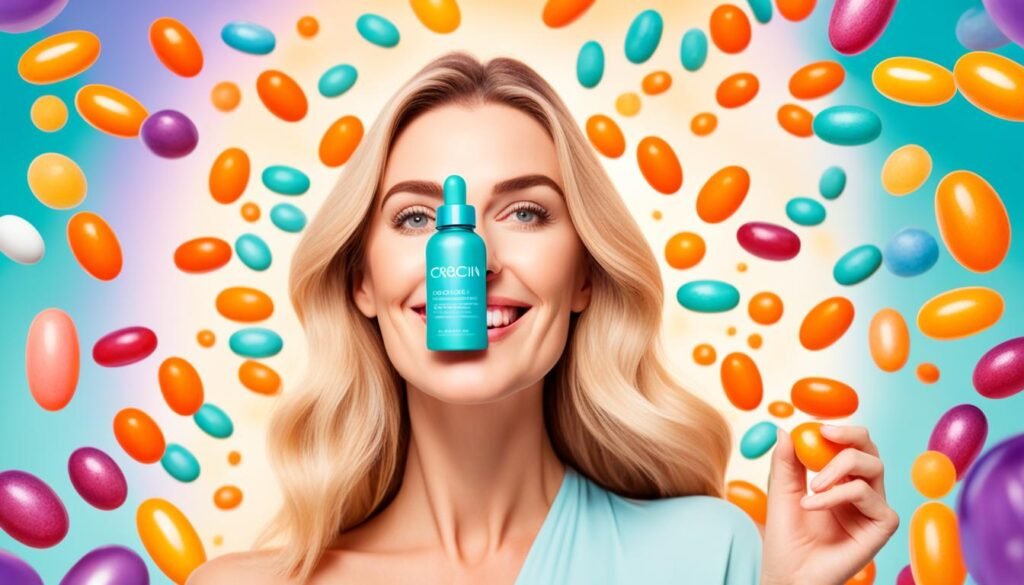
Crocin, a yellow carotenoid pigment found in saffron, offers significant benefits for wrinkle prevention and overall skin health. Its potent properties combat cellular damage and reduce inflammation, making it an effective ally against the signs of aging. Additionally, crocin has shown promising potential in protecting against cellular damage induced by UV light, which is known to accelerate skin aging.
Research has also suggested that crocin may play a role in preventing age-related cognitive decline, making it valuable in promoting mental well-being as we age.
To harness the potent advantages of crocin, consider incorporating a concentrated saffron supplement into your skincare routine. By doing so, you can enhance your skin’s defenses against cellular damage, inflammation, and the harmful effects of UV light.
| Benefits of Crocin for Wrinkle Prevention |
|---|
| Combat cellular damage |
| Reduce inflammation |
| Protect against cellular damage from UV light |
| Support cognitive health and prevent age-related decline |
As with any supplementation, it is essential to consult with a healthcare professional before incorporating saffron supplements into your routine. They will be able to provide guidance tailored to your specific needs and ensure safety and efficacy.
Vitamin C for Wrinkle Prevention
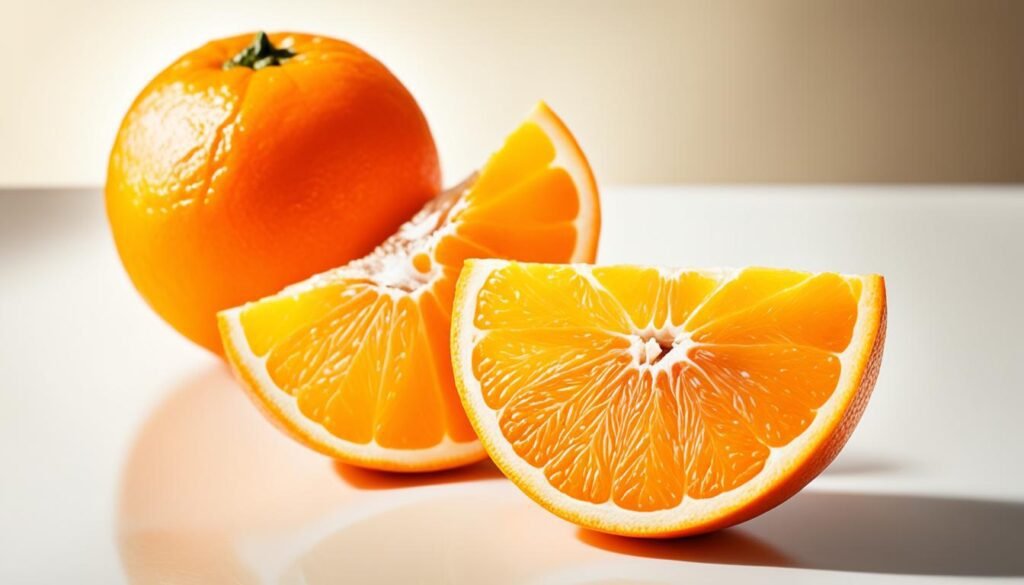
Vitamin C is a powerhouse antioxidant that provides numerous benefits for skin health and overall well-being. As an essential nutrient, it plays a vital role in supporting immune function, regulating inflammation, and promoting collagen production.
Collagen, a protein that gives skin its structure and elasticity, is crucial for maintaining a youthful complexion. However, as we age, collagen production naturally declines, leading to the formation of wrinkles and fine lines. Vitamin C helps counteract these effects by stimulating collagen synthesis, resulting in smoother, more supple skin.
Additionally, vitamin C acts as a potent antioxidant, protecting the skin against oxidative damage caused by free radicals. Free radicals are unstable molecules that wreak havoc on cells, contributing to premature aging and skin damage. By neutralizing these harmful molecules, vitamin C helps maintain the integrity of skin cells and prevents the formation of wrinkles.
Another significant benefit of vitamin C is its ability to safeguard against the effects of sun exposure. Sunlight contains ultraviolet (UV) rays that can accelerate skin aging and lead to the development of sunspots, uneven skin tone, and wrinkles. Vitamin C combats the oxidative stress caused by UV rays, minimizing sun damage and supporting skin health.
Moreover, vitamin C plays a vital role in maintaining a robust immune system. It supports immune function by aiding in the production of white blood cells and strengthening the body’s natural defense mechanisms. A healthy immune system is essential for overall well-being and can contribute to a youthful appearance.
To incorporate vitamin C into your diet, you can consume foods rich in this nutrient, such as citrus fruits, strawberries, kiwi, bell peppers, and leafy green vegetables. However, many adults have suboptimal vitamin C levels due to dietary habits or inadequate nutrient intake. In these cases, vitamin C supplementation can be beneficial in achieving optimal levels and reaping the associated skin and health benefits.
Overall, vitamin C is a valuable asset in the pursuit of wrinkle prevention and healthy, glowing skin. Its antioxidant properties, collagen-boosting effects, protection against sun damage, and immune support make it an indispensable nutrient for achieving and maintaining youthful, resilient skin.
| Benefits of Vitamin C for Wrinkle Prevention: |
|---|
| Stimulates collagen production |
| Protects against oxidative damage |
| Safeguards against sun exposure |
| Supports immune function |
Vitamin E for Wrinkle Prevention

Vitamin E is an important antioxidant that plays a crucial role in maintaining the health of our cell membranes. It protects these membranes and prevents damage to the enzymes associated with them. This protective function is particularly beneficial when it comes to preventing damage caused by sun exposure.
Studies have shown that vitamin E can reduce the damage caused by UV light, ultimately helping to limit the production of cancer-causing cells. In addition to its role in preventing skin damage, vitamin E has also been noted for its ability to reduce the signs of aging, such as photodamage and wrinkles. It can improve skin texture and promote a more youthful appearance.
But the benefits of vitamin E go beyond skin health. This essential nutrient is also known to promote heart health. It has been shown to have a protective effect on the cardiovascular system, helping to prevent the oxidation of LDL cholesterol and reducing the risk of heart disease.
Furthermore, vitamin E may also have a positive impact on cognitive health. Some studies suggest that vitamin E supplementation may help protect against age-related cognitive decline and Alzheimer’s disease.
To incorporate more vitamin E into your diet, consider adding foods such as nuts, seeds, avocados, and spinach to your meals. Additionally, vitamin E supplements are available for those who may need an extra boost.
Overall, vitamin E is a powerful antioxidant that offers a range of benefits for our skin, heart, and cognitive health. By incorporating vitamin E into our daily routines, we can promote overall well-being and maintain a youthful appearance.
Other Anti-Aging Supplements
When it comes to supporting healthy aging, there are a variety of supplements that can be beneficial. In addition to the previously mentioned vitamins and compounds, the following supplements have shown potential in promoting anti-aging effects:
Vitamin E
Vitamin E plays a vital role in immune function and inflammation regulation. It acts as an antioxidant, protecting cells from oxidative stress and damage. Incorporating vitamin E into your supplement regimen may support overall health and help combat the effects of aging.
Theanine
Theanine is an amino acid found primarily in tea leaves. It has been shown to improve brain function and promote relaxation without causing drowsiness. Additionally, theanine may protect against age-related decline and support cognitive health.
Resveratrol
Resveratrol is a compound found in red wine, grapes, and certain berries. It has gained attention for its potential anti-aging properties, particularly in protecting against premature aging caused by UV light. Incorporating resveratrol supplements into your routine may provide additional support for healthy aging.
Zinc
Zinc is an essential mineral that supports numerous bodily functions. It plays a crucial role in protein synthesis, supporting tissue repair and growth. Additionally, zinc has been associated with preventing hair loss and promoting overall hair health.
Curcumin
Curcumin, the active compound in turmeric, possesses potent anti-inflammatory and antioxidant properties. Its potential benefits for anti-aging include reducing inflammation, protecting against cellular damage, and promoting overall health and wellness.
Selenium
Selenium is a trace mineral that is important for maintaining cellular health and supporting antioxidant activity. It has been associated with longer telomeres, which are protective caps on the ends of chromosomes that naturally shorten as we age. Selenium supplementation may help reduce the risk of age-related disorders.
| Supplement | Benefits |
|---|---|
| Vitamin E | Supports immune function and inflammation regulation |
| Theanine | Improves brain function and protects against age-related decline |
| Resveratrol | Protects against premature aging caused by UV light |
| Zinc | Supports protein synthesis and helps prevent hair loss |
| Curcumin | Reduces inflammation and cellular damage |
| Selenium | Associated with longer telomeres and reduced risk of age-related disorders |
Importance of Vitamins for Slowing the Aging Process
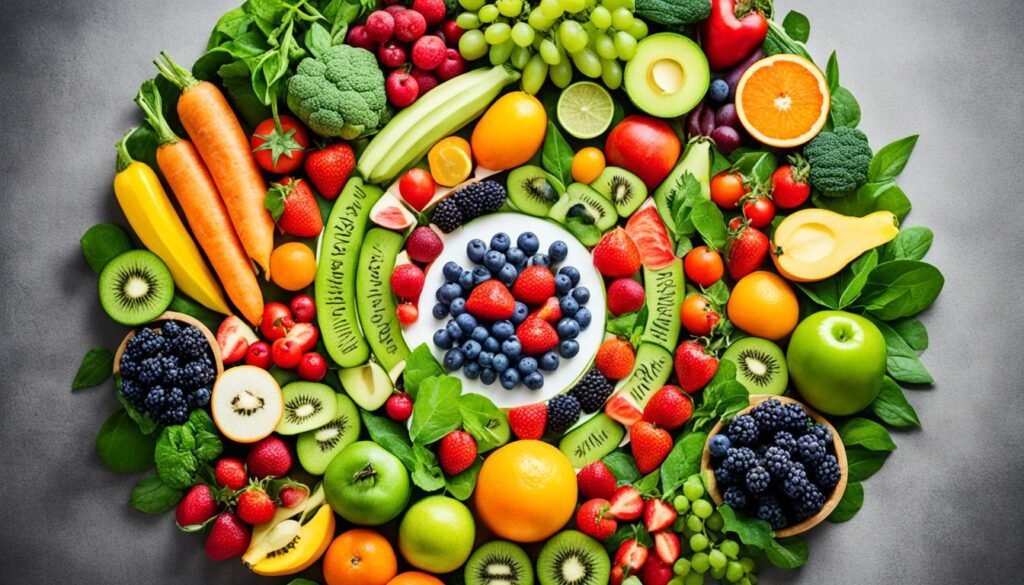
Vitamins play a crucial role in slowing the aging process, both internally and externally. While topical creams can slow the appearance of aging where they are applied, they cannot fight the aging happening within the body. Vitamins, on the other hand, work from the inside out, promoting both inner and outer health.
One important aspect of vitamin intake is their antioxidant properties. Antioxidants help protect the body’s cells from damage caused by free radicals, which are unstable molecules that can lead to skin damage and premature aging. By neutralizing these harmful molecules, antioxidants help reduce the risk of sun damage and skin damage caused by environmental factors.
There are various vitamins that have shown powerful anti-aging effects:
- Vitamin A: Supports skin cell turnover and collagen production, promoting smooth and youthful skin.
- Vitamin D: Helps regulate the immune system and prevent the breakdown of collagen, maintaining skin elasticity.
- Vitamin E: Protects cells from oxidative stress, reducing the signs of aging and promoting skin health.
- Resveratrol: Possesses antioxidant and anti-inflammatory properties, contributing to the prevention of skin damage and aging.
These vitamins can be obtained through a balanced diet or by taking supplements. However, it’s important to note that the effectiveness of these vitamins in preventing aging may vary from person to person. Consulting with a healthcare professional is recommended to determine the appropriate intake of vitamins and supplements based on individual needs.
| Vitamins | Benefits |
|---|---|
| Vitamin A | Promotes skin cell turnover and collagen production, contributing to youthful skin. |
| Vitamin D | Regulates the immune system and helps maintain skin elasticity. |
| Vitamin E | Protects cells from damage, reducing signs of aging and promoting skin health. |
| Resveratrol | Combats oxidative stress and inflammation, contributing to the prevention of skin damage and aging. |
Including these vitamins in your daily routine can help slow down the aging process and promote healthier, more youthful-looking skin. However, it’s essential to remember that vitamins are just one piece of the puzzle. Maintaining a healthy lifestyle, such as getting enough sleep, staying hydrated, exercising regularly, and protecting your skin from excessive sun exposure, is equally important in achieving optimal anti-aging results.
Conclusion
In conclusion, incorporating essential vitamins into your daily routine can have a significant impact on wrinkle prevention and overall anti-aging efforts. Vitamins such as curcumin, EGCG, collagen, CoQ10, nicotinamide riboside and nicotinamide mononucleotide, crocin, vitamin C, and vitamin E offer powerful protective and rejuvenating benefits for both the skin and body.
While topical creams may provide limited effects, supplementing with these vitamins can provide long-term support in maintaining youthful and resilient skin. These vitamins work from the inside out, promoting both inner and outer health. They play crucial roles in supporting collagen production, protecting against oxidative stress, enhancing skin hydration, and reducing the appearance of wrinkles.
However, before starting any new vitamin or supplement regimen, it is highly recommended to consult with a healthcare professional. They can provide personalized guidance and ensure that the chosen supplements align with your individual needs and medical history. With the right combination of vitamins and proper care, you can take proactive steps towards preserving your skin’s youthfulness and enjoying the benefits of effective wrinkle prevention.
FAQ
What are essential vitamins for wrinkle prevention?
Essential vitamins for wrinkle prevention include curcumin, EGCG, collagen, CoQ10, nicotinamide riboside, nicotinamide mononucleotide, crocin, vitamin C, vitamin E, and others.
How does curcumin help prevent wrinkles?
Curcumin, the active compound in turmeric, has powerful cellular protective properties and potent antioxidant effects. It delays cellular senescence, combats cellular damage, and increases lifespan.
What is the role of EGCG in wrinkle prevention?
EGCG, found in green tea, improves mitochondrial function, induces autophagy, and may protect against aging skin and brain aging.
How does collagen help prevent wrinkles?
Collagen is a protein that helps maintain skin structure. Supplementing with collagen reduces signs of aging, improves skin hydration, increases elasticity, and promotes nail growth.
What benefits does CoQ10 provide in wrinkle prevention?
CoQ10 is an antioxidant that improves overall quality of life, reduces physical and mental deterioration, and benefits heart health. It reduces oxidative stress, lowers blood pressure, and prevents the buildup of oxidized cholesterol.
How do nicotinamide riboside and nicotinamide mononucleotide contribute to wrinkle prevention?
These precursors help restore NAD+ levels, the compound involved in energy metabolism and DNA repair. They prevent age-associated cellular changes, increase NAD+ levels, and lengthen telomeres.
How does crocin aid in wrinkle prevention?
Crocin, found in saffron, combats cellular damage, reduces inflammation, and protects against cellular damage induced by UV light. It may also help prevent age-related cognitive decline.
What role does vitamin C play in wrinkle prevention?
Vitamin C is a powerful antioxidant that protects cells from oxidative damage. It improves skin hydration, stimulates collagen production, and safeguards against wrinkle development and premature aging due to sun exposure.
How does vitamin E contribute to wrinkle prevention?
Vitamin E is an important antioxidant that protects cell membranes and prevents damage caused by sun exposure. It reduces photodamage, wrinkles, improves skin texture, promotes heart health, and may protect against cognitive decline.
What are other anti-aging supplements?
Other anti-aging supplements include theanine, resveratrol, zinc, curcumin, selenium, and vitamin E. They support brain function, protect against age-related decline, combat UV-induced aging, support protein synthesis, and reduce the risk of age-related disorders.
How essential are vitamins for slowing the aging process?
Vitamins play a crucial role in slowing the aging process, both internally and externally. While topical creams can slow the appearance of aging on the surface, vitamins work from the inside out, promoting both inner and outer health.
Can vitamins completely reverse the effects of aging?
While vitamins can help slow the effects of aging and prevent age-related diseases, they cannot completely reverse the aging process. However, they can provide long-term support in maintaining youthful and resilient skin.

